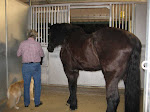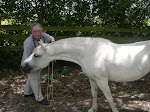I love to watch Dirty Jobs. Mike Rowe has a wonderful voice, thanks to his training as an opera singer. I also have to admit that when watching him deal with horses I frequently end up laughing myself silly.
Last night I was watching him handle a group of draft horses and was amused at both his body language and his voice. While trying to lead four Belgium horses (he called them Percherons, but if you want to know what a Percheron really looks like look at Doc's picture) he tried to slow them down and stop them by repeating whoa in an increasingly higher tone of voice. The body language alone was enough to cause the horses to ignore him, but add the voice and you were assured those horses were not going to regard him as anyone to take seriously.
When I was a teen I thought I wanted to be a vet. It was the wrong time because women were not allowed in vet school; which was a good thing in my case. While I’m very good at dealing with animals I’m lousy when it comes to dealing with humans. A vet has to be good with humans as well as animals.
Nevertheless, I got a job in a vet clinic while I was in high school and learned a lot there. One thing I learned was the importance of quiet confidence when it comes to handling any animal, regardless of species.
An early example of this was the day a woman brought her Peke in for his annual check up and shots. When the little guy strutted into the examination room I said "Hi, kiddo," and reached down, grabbed him firmly and hoisted him onto the table. Everyone, the Doctor included, gasped. It seems this particular dog had quite a reputation for biting.
I’ll have to confess here that I had an advantage concerning this particular dog. He was one of my mother’s breeding. I knew how he’d been started out and his basic temperament so I had confidence that he was a sensible dog. Which he was, he’d just been allowed to think he was top dog in his household and took full advantage of it. When confronted with a person who knew better he was perfectly willing to behave.
That absolute confidence is what every animal trainer needs in order to handle animals safely. Without it even a Chihuahua can control the human. With it a human can control an elephant. The confidence has to come from knowledge and skill. But we humans like to use our voices. We are a very vocal species. We can use this tendency either in a right way or wrong way.
It is necessary to learn how to “read” an animal and its body language. Dogs are fairly easy because they are predators and humans are predators. We have a common language that we can use. Horses are difficult because they are strictly prey animals and have a vested interest in doing just the opposite of what we want them to do.
One of the first things I always tell students is “Everything you want to do naturally is wrong.”
In working with horses we have to completely retrain ourselves in order to gain a horse’s trust and cooperation. This takes years of effort and practice. Gaining that absolute confidence is a long journey and there are more than a few pit falls along the way.
None of this is to say you can handle dogs without making the effort to acquire knowledge and practice skills; because you must learn how to meet their needs and communicate in a manner the dog can understand in order to have a successful partnership with your canine companion.
One huge mistake a lot (really most) people make with both dogs and horses is using a high pitched voice. The reason this is so wrong is because among horses high pitches signal danger and distress. Dogs have a different take on a high pitched voice. To them this is the sign of a prey animal they can take down. As you can see the reactions of horses and dogs are opposite, but the result is bad for humans in both cases.
Low pitches to horses are friendly. These are the pitches used among companions, mares and their foals, a stallion to a mare. Low pitch is good.
Likewise low, calm pitched voices are good with dogs because this doesn’t rev their hunting and killing drives.
In addition to low-slow speech is also a good thing. Animals have lightening quick reflexes and the more you can slow these down the easier it is to handle your horse or dog.
Lazy Trainer’s Tip
About the most important thing you can do when around animals (besides using correct body language) is always use a low pitch when speaking. Practice using the lowest pitch you are capable of until it becomes second nature when you are in the presence of a horse or dog.
Don’t forget to add slow to this practice as well. While body language is how both dogs and horses really do most of their communicating they do use some vocalization and we can take advantage of this by keeping the low and slow mantra in mind.
Tuesday, May 6, 2008
Subscribe to:
Post Comments (Atom)










No comments:
Post a Comment